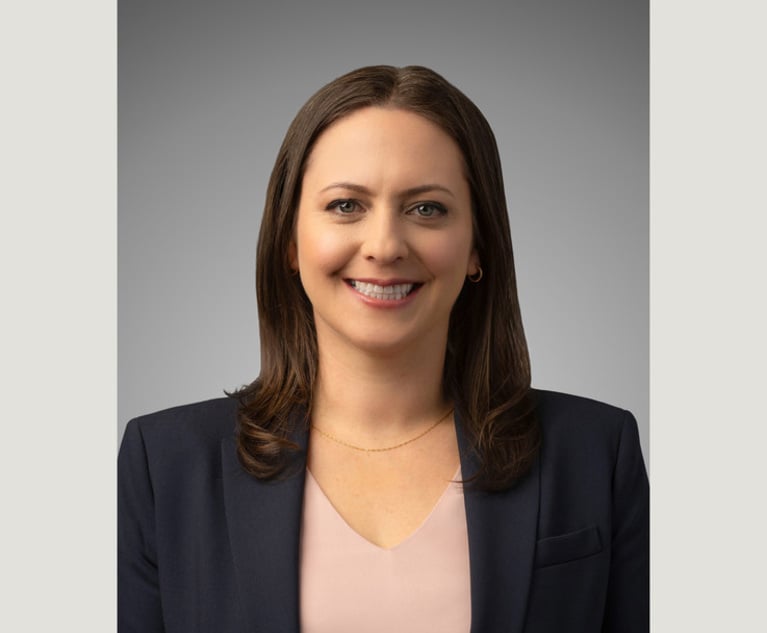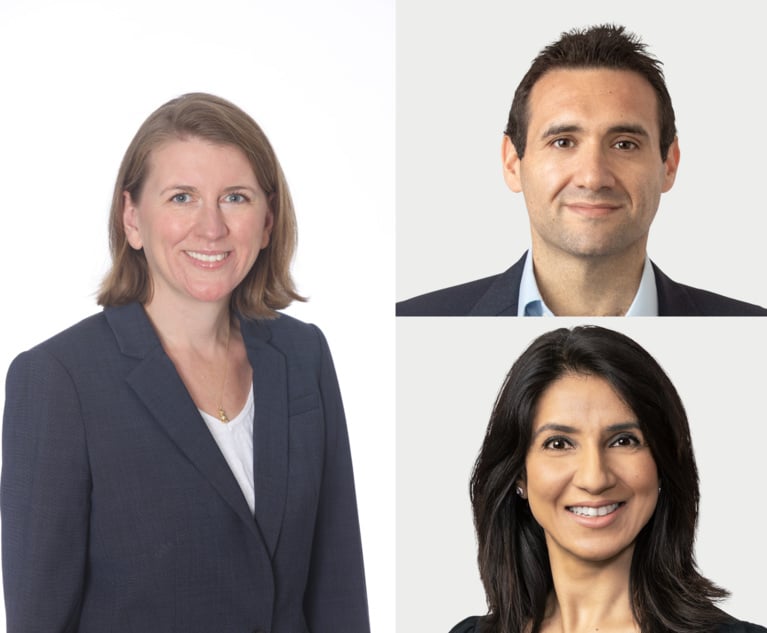Amal Clooney: Too Beautiful to Be a Serious Lawyer?
Research shows that beauty can be a detriment to working women because they are perceived as "seductive yet manipulative."
May 01, 2019 at 11:37 AM
4 minute read
 Amal Clooney. Photo: Shutterstock.
Amal Clooney. Photo: Shutterstock.
Talk about fortuitous timing. I was on my way to see Amal and George Clooney at Columbia Law School last week when this New York Times article popped into my in-box: “Pretty Can Hurt Women's Careers.”
In case you didn't know, Amal is not merely “pretty” but gorgeous. And, in person, I thought she was downright goddess-like. (George is OK, though not a Greek god.)
She's also a highly respected human rights lawyer. She's advocated on behalf of leaders who've lost power (including former Ukrainian prime minister Yulia Tymoshenko and former Maldivian president Mohamed Nasheed) as well as those who've suffered in anonymity (such as the plight of the 6,700 Yazidi women held captive by the Islamic State and jailed journalists in places like Myanmar and Egypt).
And her latest endeavor, which was the reason for the gathering at Columbia Law, sounds damn impressive, too. It's an initiative called TrialWatch that trains lawyers, journalists and laymen to monitor trials around the world. Microsoft, whose president Brad Smith also shared the stage (but who remembers him or the other luminaries?), is partnering with the Clooney Foundation and has developed an app for the monitors to assess the fairness of trials.
 Amal's work is serious and worthy, so why am I now talking about her looks? Well, it's hard to ignore. And if we're being honest, I think a lot of women find her intimidating. Not only does she look perfect, she's married to a rich and famous husband who supports her career. She's a working mom to boot.
Amal's work is serious and worthy, so why am I now talking about her looks? Well, it's hard to ignore. And if we're being honest, I think a lot of women find her intimidating. Not only does she look perfect, she's married to a rich and famous husband who supports her career. She's a working mom to boot.
Which brings us to the challenges of being an attractive woman. Reporting on research from Washington State University and the University of Colorado Boulder, the Times article says that attractive women in business face loads of resentment and prejudice.
Contrary to popular belief that pretty women at work are regarded as bimbos, the study finds that they are perceived as “seductive yet manipulative.” In fact, both men and women considered them “less trustworthy, less truthful and more worthy of being fired than other women.” The article says they arouse “primal feelings of sexual insecurity, jealousy and fear.”
Sexual insecurity, jealousy and fear—well, I guess that sums it up about how some of us earthly critters feel in the presence of a goddess at the office. (This doesn't happen often in Big Law, though Amal was an associate at Sullivan & Cromwell once upon a time.)
“Of all the concerns that the women's movement have brought to focus, this is the one that we've made the least progress,” says Stanford Law professor Deborah Rhode, the author of “Beauty Bias,” a book about how physical appearance affects women's lives. She says women's focus on looks “takes a toll in time and self-esteem,” and that social media has made the problem worse. “Women are less happy with their appearance today than they were 25 years ago.”
In the workplace, women are expected to look good, but not overly so, lest their credibility is called into question. “They are either too attractive or not enough,” says Rhode. “It underscores the double bind of beauty standard for women.”
So the lovely and the not-so-lovely are both judged harshly. Wait a minute. I'm not sure I buy that. All things being equal, isn't it still better to be unbearably beautiful than homely?
Of course, says Rhode. “Those who look good still have advantage than those who don't. In getting hired and promoted, it helps if you're attractive.” However, there's a limit to that advantage: At very high level jobs, very attractive women can suffer, says Rhode. But, she adds, they can downplay their sex appeal, whereas “unattractive people have fewer options.”
Her advice: “We should value people for who they are and what they do. We should celebrate Amal and husband have done for human rights.” As for comparing ourselves against Amal, “it's an impossible standard,” says Rhode. “That's not realistic, but caring about others is realistic for everyone.”
Hear that? Let it go. We should just focus on Amal's good deeds and forget about the rest of the package.
We'll work on that.
Contact Vivia Chen at [email protected]. On Twitter: @lawcareerist.
This content has been archived. It is available through our partners, LexisNexis® and Bloomberg Law.
To view this content, please continue to their sites.
Not a Lexis Subscriber?
Subscribe Now
Not a Bloomberg Law Subscriber?
Subscribe Now
NOT FOR REPRINT
© 2025 ALM Global, LLC, All Rights Reserved. Request academic re-use from www.copyright.com. All other uses, submit a request to [email protected]. For more information visit Asset & Logo Licensing.
You Might Like
View All


Weil Lures DOJ Antitrust Lawyer, As Government Lateral Moves Pick Up Before Inauguration Day
5 minute readTrending Stories
Who Got The Work
J. Brugh Lower of Gibbons has entered an appearance for industrial equipment supplier Devco Corporation in a pending trademark infringement lawsuit. The suit, accusing the defendant of selling knock-off Graco products, was filed Dec. 18 in New Jersey District Court by Rivkin Radler on behalf of Graco Inc. and Graco Minnesota. The case, assigned to U.S. District Judge Zahid N. Quraishi, is 3:24-cv-11294, Graco Inc. et al v. Devco Corporation.
Who Got The Work
Rebecca Maller-Stein and Kent A. Yalowitz of Arnold & Porter Kaye Scholer have entered their appearances for Hanaco Venture Capital and its executives, Lior Prosor and David Frankel, in a pending securities lawsuit. The action, filed on Dec. 24 in New York Southern District Court by Zell, Aron & Co. on behalf of Goldeneye Advisors, accuses the defendants of negligently and fraudulently managing the plaintiff's $1 million investment. The case, assigned to U.S. District Judge Vernon S. Broderick, is 1:24-cv-09918, Goldeneye Advisors, LLC v. Hanaco Venture Capital, Ltd. et al.
Who Got The Work
Attorneys from A&O Shearman has stepped in as defense counsel for Toronto-Dominion Bank and other defendants in a pending securities class action. The suit, filed Dec. 11 in New York Southern District Court by Bleichmar Fonti & Auld, accuses the defendants of concealing the bank's 'pervasive' deficiencies in regards to its compliance with the Bank Secrecy Act and the quality of its anti-money laundering controls. The case, assigned to U.S. District Judge Arun Subramanian, is 1:24-cv-09445, Gonzalez v. The Toronto-Dominion Bank et al.
Who Got The Work
Crown Castle International, a Pennsylvania company providing shared communications infrastructure, has turned to Luke D. Wolf of Gordon Rees Scully Mansukhani to fend off a pending breach-of-contract lawsuit. The court action, filed Nov. 25 in Michigan Eastern District Court by Hooper Hathaway PC on behalf of The Town Residences LLC, accuses Crown Castle of failing to transfer approximately $30,000 in utility payments from T-Mobile in breach of a roof-top lease and assignment agreement. The case, assigned to U.S. District Judge Susan K. Declercq, is 2:24-cv-13131, The Town Residences LLC v. T-Mobile US, Inc. et al.
Who Got The Work
Wilfred P. Coronato and Daniel M. Schwartz of McCarter & English have stepped in as defense counsel to Electrolux Home Products Inc. in a pending product liability lawsuit. The court action, filed Nov. 26 in New York Eastern District Court by Poulos Lopiccolo PC and Nagel Rice LLP on behalf of David Stern, alleges that the defendant's refrigerators’ drawers and shelving repeatedly break and fall apart within months after purchase. The case, assigned to U.S. District Judge Joan M. Azrack, is 2:24-cv-08204, Stern v. Electrolux Home Products, Inc.
Featured Firms
Law Offices of Gary Martin Hays & Associates, P.C.
(470) 294-1674
Law Offices of Mark E. Salomone
(857) 444-6468
Smith & Hassler
(713) 739-1250











